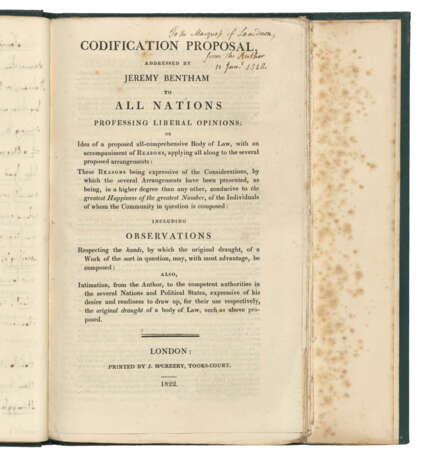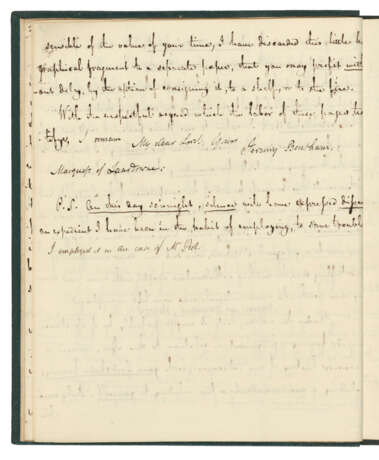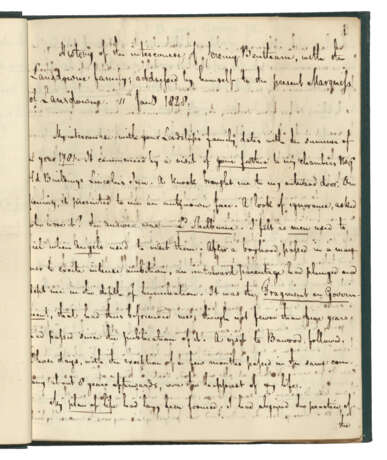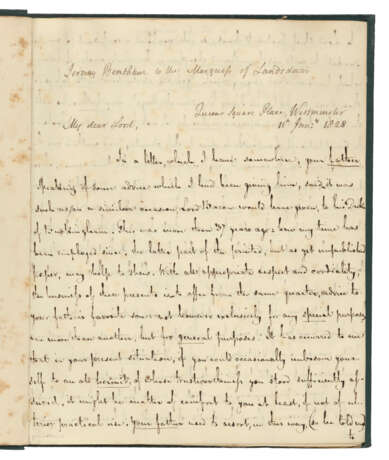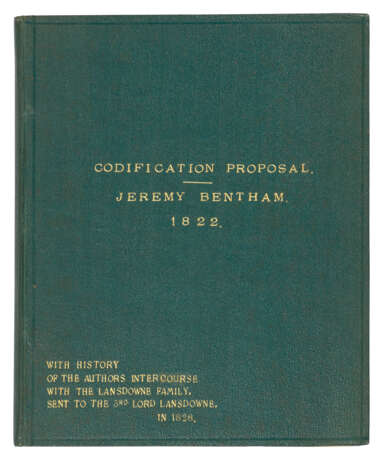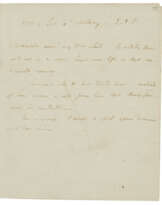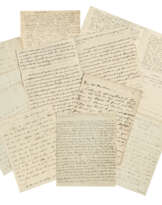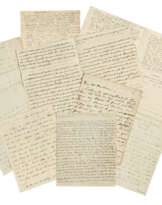ID 1249768
Lot 52 | Jeremy Bentham (1748-1832)
Estimate value
£ 5 000 – 8 000
Letter, document and pamphlet signed and inscribed to the 3rd Marquess of Lansdowne, 11 January 1828
Letter signed (‘Jeremy Bentham’) to the 3rd Marquess of Lansdowne (‘My dear Lord’), Queen’s Square Place, 11 January 1828, with autograph superscription, corrections and subscription. 6 pages, 225 x 180mm;
[With:] conjugate supplementary document signed, ‘History of the intercourse of Jeremy Bentham, with the Lansdowne family, addressed by himself to the present Marquess of Lansdowne’. 15 pages, 225 x 180mm;
[Bound in one volume with:] Codification Proposal, addressed by Jeremy Bentham to all Nations professing liberal Opinions, London, privately printed by J. M’Creery, 1822, autograph inscription on title ‘To the Marquess of Lansdowne from the Author, 11 Jany. 1828’. 220 x 140mm. Provenance: Marquesses of Lansdowne; their sale, Christie’s, Bowood House sale, 12 October 1994, lot 7.
A remarkable piece of autobiography from the 80-year-old Jeremy Bentham, looking back on his life and political career, intertwined with that of the 1st Marquess of Lansdowne, offering advice to the young 3rd Marquess, favourite son of his patron, political ally and close friend: ‘… with all appropriate respect and cordiality, the business of these presents is to offer from the same quarter, advice […] It has occurred to me that in your present situation, if you could occasionally unbosom yourself to an old hermit, of whose trustworthiness you stood sufficiently assured, it might be matter of comfort to you at least, if not of ulterior practical use. Your father used to resort in this way’. Further on he continues, ‘You are at the head of the Whigs. In those days […] Your father, as well as the Duke of Richmond, was a radical. I, not having as yet looked into the Constitutional Law with a view to this country, was neither one thing nor another. In the course of my enquiries when the time came, observation and study made me what I am at present a republican’. He mentions various subjects for possible bills in Parliament, including ‘Subjects for Dissection’ (‘Health and Life were and have long been suffering incalculable injury from the want of subjects for dissection; if my will is obeyed, my own body will very soon do what depends on me towards the relief of that want’) and ‘Jury-packing’ (‘as affording a promise of well-deserved popularity […] abolishing packing as applied to Juries’). Bentham ends the letter – ‘Under the notion, that it might possibly be of assistance towards forming a judgement in relation to this offer inclosed is a concise history, of my intercourse with your Lordship’s family’ – moving straight into an account of his relationship with the Lansdowne family across the years [‘History of the intercourse of Jeremy Bentham’, listed above]: ‘My intercourse with your Lordship’s family dates with the summer of the year 1781. It commenced by a visit of your father to my chambers […] I felt as men used to feel when angels used to visit them’. In a later chapter, ‘J.B. versus George III’, he explains how the king had ‘driven the country into an unprovoked war with Russia’, admitting how, under the pseudonym Anti-Machiavel he wrote articles in the newspapers attacking the king. This is followed by ‘Prisoners and Paupers’, blaming the king for ‘breaking the faith of Parliament to me’ and thus denying his plans for prison reform, a section on the French Revolution, and, under the heading ‘Proposals for Family Alliance with J.B.’, the claim that he was offered in marriage various ladies connected with Lansdowne, but ‘A man can have but one wife at a time, and it was my destiny to have none’.
| Artist: | Jeremy Bentham (1748 - 1832) |
|---|---|
| Place of origin: | England, Northern Europe, Europe, United Kingdom |
| Auction house category: | Letters, documents and manuscripts, Books and manuscripts |
| Artist: | Jeremy Bentham (1748 - 1832) |
|---|---|
| Place of origin: | England, Northern Europe, Europe, United Kingdom |
| Auction house category: | Letters, documents and manuscripts, Books and manuscripts |
| Address of auction |
CHRISTIE'S 8 King Street, St. James's SW1Y 6QT London United Kingdom | |
|---|---|---|
| Preview |
| |
| Phone | +44 (0)20 7839 9060 | |
| Buyer Premium | see on Website | |
| Conditions of purchase | Conditions of purchase |
